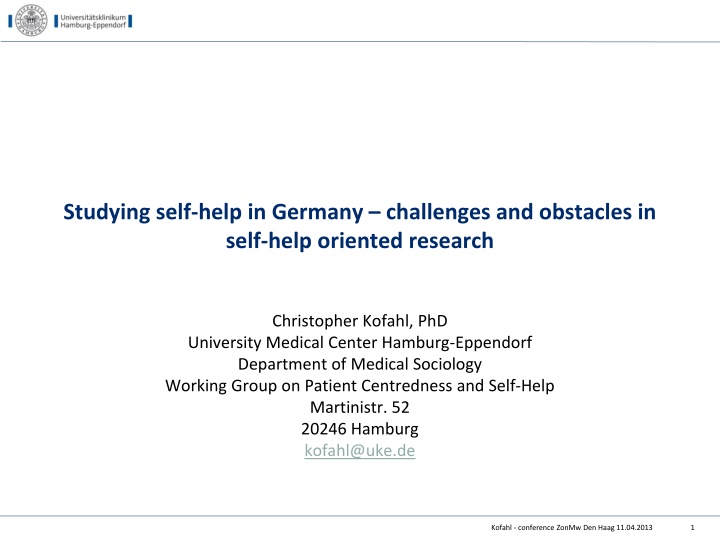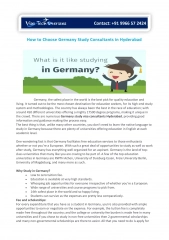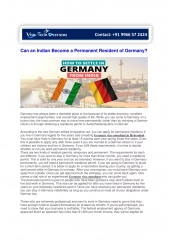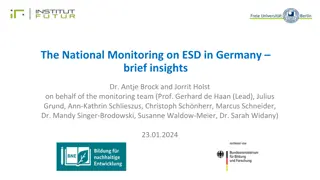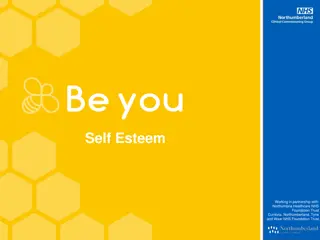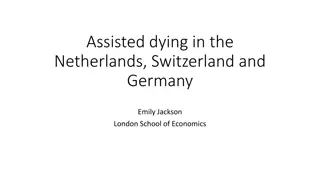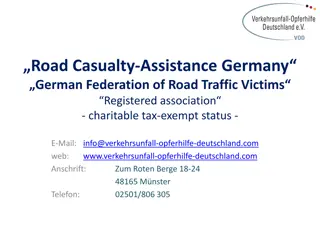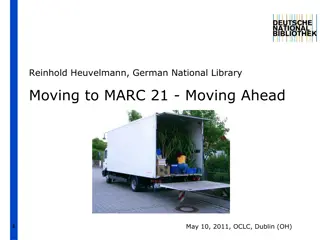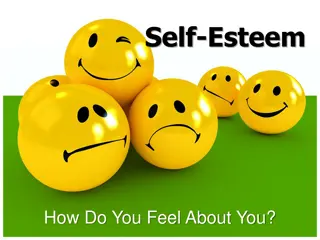Challenges in Self-Help Research in Germany
Exploring the landscape of self-help research in Germany reveals various challenges and obstacles faced by researchers in studying self-help initiatives. The research delves into different aspects such as research scope, involvement of various groups, and the entities conducting research in this domain. Factors like difficulty in obtaining funds, conducting research, and publishing findings contribute to the complexity of self-help research. Despite these hindrances, universities and patient organizations are actively engaged in conducting research to support self-help initiatives on both regional and national levels.
Download Presentation

Please find below an Image/Link to download the presentation.
The content on the website is provided AS IS for your information and personal use only. It may not be sold, licensed, or shared on other websites without obtaining consent from the author.If you encounter any issues during the download, it is possible that the publisher has removed the file from their server.
You are allowed to download the files provided on this website for personal or commercial use, subject to the condition that they are used lawfully. All files are the property of their respective owners.
The content on the website is provided AS IS for your information and personal use only. It may not be sold, licensed, or shared on other websites without obtaining consent from the author.
E N D
Presentation Transcript
Studying self-help in Germany challenges and obstacles in self-help oriented research Christopher Kofahl, PhD University Medical Center Hamburg-Eppendorf Department of Medical Sociology Working Group on Patient Centredness and Self-Help Martinistr. 52 20246 Hamburg kofahl@uke.de Kofahl - conference ZonMw Den Haag 11.04.2013 1
Self-Help Research in Germany Research with whom? Research by whom? Research about what? Kofahl - conference ZonMw Den Haag 11.04.2013 2
Research with whom? The wide scope of self-help SHG = self help group in the meaning of mutual support and help between peers, usually face to face, mostly on a regional level, mainly aiming at individual and/or local solutions or improvement in daily affairs SHO = self help organisation in the meaning of indication based patient collectives, usually (semi-)professionally organised using a wide range of communication technologies mostly on a supra-regional level mainly aiming at collective affairs like quality improvement in care, political representation and influence, inclusion and integration, arising awareness, knowledge and information Kofahl - conference ZonMw Den Haag 11.04.2013 3
Research with whom? The wide scope of self-help SHA = self help alliances in the meaning of supra-indication based umbrella organisations of SHOs usually professionally organised using a wide range of communication technologies supported by qualified professional staff national and international level aiming at political participation and integration delegating patient representatives SHSS = self-help support system about 300 clearing houses on self-help, offices of the welfare organisations, independent patient counselling offices, (health) consumer organisations etc. regional and national level aiming at supporting SHGs and patients interests Kofahl - conference ZonMw Den Haag 11.04.2013 4
Research by whom? Who is conducting self-help research in Germany? Universities and Universities of Applied Sciences just a few working groups primarily in the fields of medical sociology/psychology, political science, social law and social management and social work problem: self-help research is unattractive for many researchers difficult to conduct, difficult to get funds, difficult to publish Self-Help and Patient Organisations many of the bigger SHOs are running own research activities, often in co-operation with research institutions problem: research work is often underfunded, research designs are often limited compared to scientific standards, publications are usually in German only and often self-published, therefore difficult to find Kofahl - conference ZonMw Den Haag 11.04.2013 5
Research by whom? Who is conducting self-help research in Germany? Clearinghouses for Self-Help different and manifold research activities on specific topics, smaller studies or socio-political reflections etc. German Working Group for Self-Help Groups (DAG SHG) DAG SHG is stimulating scientific contributions towards self-help activities (e.g. regular conferences, the Yearbook Self-Help Groups) National Clearinghouse for the Encouragement and Support of Self-Help Groups (NAKOS) in Berlin NAKOS is the centre for aggregated data on SHGs and SHOs, is running own research projects on actual topics (e.g. Younger people in Self-Help , Self-help through the internet , Patient Centredness etc. -> regular publications, e.g. NAKOS info ) Kofahl - conference ZonMw Den Haag 11.04.2013 6
Research about what? Kofahl - conference ZonMw Den Haag 11.04.2013 7
Why Self-help Research? The main focus: Patient- -involvement, -participation, -integration, -inclusion, - between Solidarity and Subsidiarity Kofahl - conference ZonMw Den Haag 11.04.2013 8
Why Self-help Research? 4 Theses of patient participation and integration SHOs, SHGs and patients are provided with necessary opportunities and resources to be able to contribute to political decision making (thesis of empowerment). SHOs, SHGs and patients are offered placebo participation to present their views, but without relevant rights or chances to really influence policies (thesis of pacification). SHOs, SHGs and patients are encouraged to provide other patients with information and advice. Are SHGs and SHOs at risk to become a substitute for cut health care services? (thesis of instrumentalisation). SHOs and SHGs are acting below their potential capacities due to lacking resources and administrative barriers (thesis of brain and resources waste). Kofahl - conference ZonMw Den Haag 11.04.2013 9
What? Here a long list of research questions Kofahl - conference ZonMw Den Haag 11.04.2013 10
What? Also: Effects? Efficacy?? Effectiveness??? In which areas and dimensions can SHG and SHO be effective at all? If they can be effective, what are the relevant outcomes, and who is defining those? Are SHG- and SHO-activities and results measurable ? What are the measures? Are these - in terms of EBM - comparable at all? Is the RCT an adequate research design for self-help research? And - if not -, is this acceptable for decision makers? Kofahl - conference ZonMw Den Haag 11.04.2013 11
Finally, some advertising Kofahl - conference ZonMw Den Haag 11.04.2013 12
Advertising Kofahl - conference ZonMw Den Haag 11.04.2013 13
Thank you for your attention! Don t talk about self- help! This is unacceptable Kofahl - conference ZonMw Den Haag 11.04.2013 14
